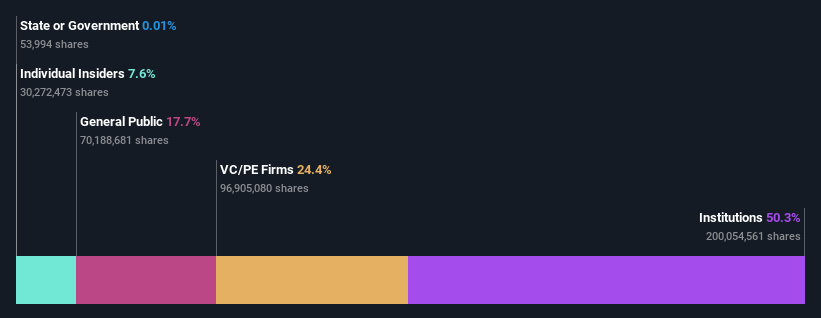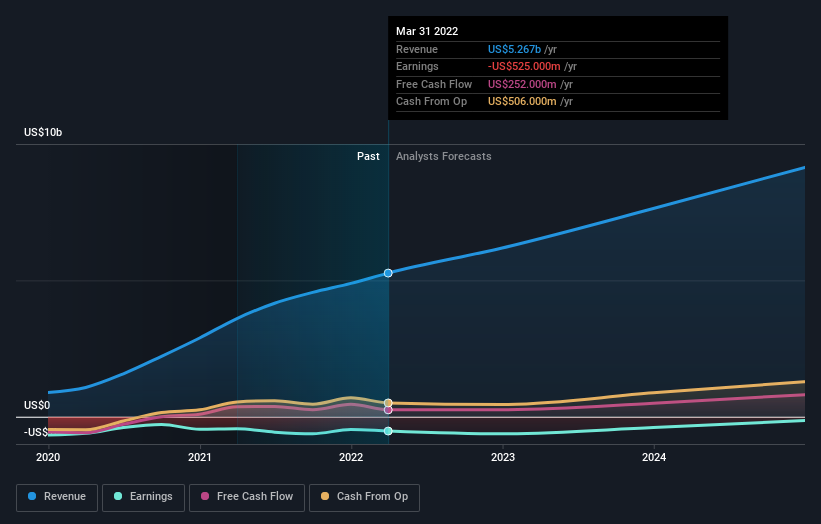Stock Analysis
- United States
- /
- Hospitality
- /
- NasdaqGS:DASH
Is DoorDash, Inc.'s (NYSE:DASH) Shareholder Ownership Skewed Towards Insiders?

If you want to know who really controls DoorDash, Inc. (NYSE:DASH), then you'll have to look at the makeup of its share registry. Insiders often own a large chunk of younger, smaller, companies while huge companies tend to have institutions as shareholders. I generally like to see some degree of insider ownership, even if only a little. As Nassim Nicholas Taleb said, 'Don’t tell me what you think, tell me what you have in your portfolio.
DoorDash is a pretty big company. It has a market capitalization of US$28b. Normally institutions would own a significant portion of a company this size. In the chart below, we can see that institutions own shares in the company. We can zoom in on the different ownership groups, to learn more about DoorDash.
See our latest analysis for DoorDash

What Does The Institutional Ownership Tell Us About DoorDash?
Many institutions measure their performance against an index that approximates the local market. So they usually pay more attention to companies that are included in major indices.
We can see that DoorDash does have institutional investors; and they hold a good portion of the company's stock. This implies the analysts working for those institutions have looked at the stock and they like it. But just like anyone else, they could be wrong. It is not uncommon to see a big share price drop if two large institutional investors try to sell out of a stock at the same time. So it is worth checking the past earnings trajectory of DoorDash, (below). Of course, keep in mind that there are other factors to consider, too.

Investors should note that institutions actually own more than half the company, so they can collectively wield significant power. Hedge funds don't have many shares in DoorDash. Sequoia Capital Operations LLC is currently the company's largest shareholder with 9.7% of shares outstanding. With 8.4% and 6.3% of the shares outstanding respectively, SoftBank Investment Advisers (UK) Limited and T. Rowe Price Group, Inc. are the second and third largest shareholders. Additionally, the company's CEO Tony Xu directly holds 2.6% of the total shares outstanding.
A closer look at our ownership figures suggests that the top 11 shareholders have a combined ownership of 52% implying that no single shareholder has a majority.
While it makes sense to study institutional ownership data for a company, it also makes sense to study analyst sentiments to know which way the wind is blowing. There are a reasonable number of analysts covering the stock, so it might be useful to find out their aggregate view on the future.
Insider Ownership Of DoorDash
While the precise definition of an insider can be subjective, almost everyone considers board members to be insiders. Management ultimately answers to the board. However, it is not uncommon for managers to be executive board members, especially if they are a founder or the CEO.
Most consider insider ownership a positive because it can indicate the board is well aligned with other shareholders. However, on some occasions too much power is concentrated within this group.
We can see that insiders own shares in DoorDash, Inc.. It is a very large company, and board members collectively own US$2.1b worth of shares (at current prices). It is good to see this level of investment. You can check here to see if those insiders have been buying recently.
General Public Ownership
With a 18% ownership, the general public, mostly comprising of individual investors, have some degree of sway over DoorDash. While this size of ownership may not be enough to sway a policy decision in their favour, they can still make a collective impact on company policies.
Private Equity Ownership
With an ownership of 24%, private equity firms are in a position to play a role in shaping corporate strategy with a focus on value creation. Some might like this, because private equity are sometimes activists who hold management accountable. But other times, private equity is selling out, having taking the company public.
Next Steps:
I find it very interesting to look at who exactly owns a company. But to truly gain insight, we need to consider other information, too. Be aware that DoorDash is showing 4 warning signs in our investment analysis , you should know about...
Ultimately the future is most important. You can access this free report on analyst forecasts for the company.
NB: Figures in this article are calculated using data from the last twelve months, which refer to the 12-month period ending on the last date of the month the financial statement is dated. This may not be consistent with full year annual report figures.
Valuation is complex, but we're helping make it simple.
Find out whether DoorDash is potentially over or undervalued by checking out our comprehensive analysis, which includes fair value estimates, risks and warnings, dividends, insider transactions and financial health.
View the Free AnalysisHave feedback on this article? Concerned about the content? Get in touch with us directly. Alternatively, email editorial-team (at) simplywallst.com.
This article by Simply Wall St is general in nature. We provide commentary based on historical data and analyst forecasts only using an unbiased methodology and our articles are not intended to be financial advice. It does not constitute a recommendation to buy or sell any stock, and does not take account of your objectives, or your financial situation. We aim to bring you long-term focused analysis driven by fundamental data. Note that our analysis may not factor in the latest price-sensitive company announcements or qualitative material. Simply Wall St has no position in any stocks mentioned.
About NasdaqGS:DASH
DoorDash
Operates a commerce platform that connects merchants, consumers, and independent contractors in the United States and internationally.
Flawless balance sheet with reasonable growth potential.

